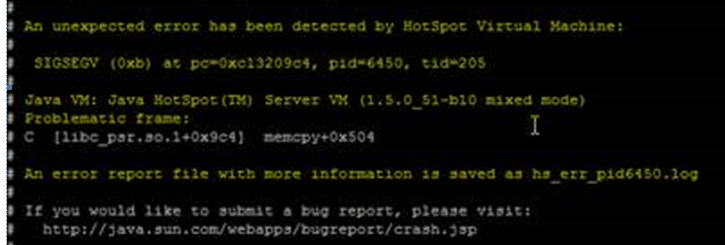If you know how to debug jvm crashing on your computer, hopefully this article can help you fix it.
Approved: Fortect

I am very confused and do not know how to approach and solve my individual problem. I have a simple Java code snippet that is causing the JVM to crash:
## Java runtime encountered fatal error:## SIGSEGV (0xb) on pc = 0x00000001057ce9d4, pid = 10727, tid = 18947## JRE plan: Java SE Runtime Environment (tm) (8.0_73-b02) (build 1.8.0_73-b02)# Java Virtual Machine: HotSpot (TM) Server 64-bit Java Virtual Machine (25.73-b02, mixed mode, bsd-amd64, compressed oh)# Problematic V-frame:# [libjvm.dylib + 0x3ce9d4] PhaseIdealLoop :: idom_no_update (Node *) const + 0x12## Failed to write core dump. Base repositories are disabled. To enable kernel uninstallation, try ulimit -c unlimited before restarting Java.## If you would like to suggest a bug report, visit:# Http://bugreport.java.com/bugreport/crash.jsp#--------------- THE WIRE ---------------Current thread (0x00007feeef003800): JavaThread daemon "C2 CompilerThread0" [_thread_in_native, id = 18947, stack (0x0000700000ec4000,0x0000700000fc4000)]siginfo: si_signo: 18 (SIGSEGV), si_code: 1 Si_addr: (segv_maperr), 0x00000000000000008

I have no idea how to solve the problem. The program is quite simple, it receives a message from Kafka in addition to the message-based trigger tasks. When I add two different tasks, each program gets 900 to 1500 warnings after a crash. All posts are exactly the same and the program does not use any new JNI stuff (the third party collections used also do not use JNI as I was informed).

I have never had this suffering problem, but I would like / have toThis is your way of figuring out what the problem is. I have already used the second JVM versions (Java 8.0_66, 8.0_73-b02 combined with 8.0_74-b02). So what can I do? Thanks !
so ...# JRE version: java OS runtime (tm) (8.0_73-b02) (build 1.8.0_73-b02)# Java Virtual Machine: HotSpot (TM) Server 64-bit Java Virtual Machine (25.73-b02, mixed mode, bsd-amd64, compressed oh)# Problematic V-frame:# [libjvm.dylib + 0x3ce9d4]...
EDIT (2): I have updated my Java version to 8.0_74. The error is indeed still there :(.
Approved: Fortect
Fortect is the world's most popular and effective PC repair tool. It is trusted by millions of people to keep their systems running fast, smooth, and error-free. With its simple user interface and powerful scanning engine, Fortect quickly finds and fixes a broad range of Windows problems - from system instability and security issues to memory management and performance bottlenecks.

## Java runtime encountered fatal error:## SIGSEGV (0xb) on pc = 0x00000001073cdef8, pid = 11227, tid = 19715## JRE version: java OS runtime (tm) (8.0_74-b02) (build 1.8.0_74-b02)# VM: Java Java HotSpot (TM) 64-bit Server VM (25.74-b02 Mixed Mode bsd-amd64, abbreviated oops)# Problematic framework:# V [libjvm. ... ... dylib + 0x3cdef8] PhaseIdealLoop :: idom_no_update (Node *) const + 0x12## Error writing body dump. Kernel dumps are disabled. To tune the core dump try ulimit -c unlimited before restarting Java## If you would like to submit a bug report, visit:# Http://bugreport.java.com/bugreport/crash.jsp#--------------- THE WIRE ---------------Current safe thread (0x00007f89e481c800): JavaThread daemon "C2 CompilerThread1" [_thread_in_native, id = 19715, stack (0x000070000104a000,0x000070000114a000)]siginfo: si_signo: 11 (SIGSEGV), si_code: 5 (SEGV_MAPERR), si_addr: 0x000000000000008
So, I finally dumped the Verizon core and loaded it into Java VisualVM (I couldn’t use the solution organized by DROY because the jmap call resulted in another error: “Error adding to main list: unable to connect to core . file “”). A thread dump was generated by VisualVM with the results:
Subject 30239 "Keep-Alive-Timer": (state = LOCKED) at java.lang.Thread.Method) sleep (native to sun.net.www.http.KeepAliveCache.run (KeepAliveCache.java: 172) at java.lang.Thread.run (Thread.java:745)Thread 29699 (Status "threaddeathwatcher-4-1": = LOCKED) by going to java.lang.Thread.sleep (native method) io at.netty.util.ThreadDeathWatcher $ Watcher.run (ThreadDeathWatcher.java:137) at io.netty.util.concurrent.DefaultThreadFactory $ DefaultRunnableDecorator.run (DefaultThreadFactory.java:137) at java.lang.Thread.run (Thread.java:745)Stream 26635 (state 'nioeventloopgroup-3-1': implies IN_NATIVE) at sun.nio.ch.KQueueArrayWrapper.Method) kevent0 (native from sun.nio.ch.KQueueArrayWrapper.poll (KQueueArrayWrapper.java: 198) at sun.nio.ch.KQueueSelectorImpl.doSelect (KQueueSelectorImpl.java:117) with sun.nio.ch.SelectorImpl.lockAndDoSelect (SelectorImpl.java:86) - <0x00000006c049ec98> Io fixed (a.netty.channel.nio. Selectedselectionkeyset) - safe <0x00000006c049ec88> (java.util.Collections $ UnmodifiableSet) 2.locked <0x00000006c049ecb8> (a sun.nio.ch.KQueueSelectorImpl) At sun.nio.ch.SelectorImpl.select (SelectorImpl.java:97) available at io.netty.channel.nio.NioEventLoop.select (NioEventLoop.java:622) at io.netty.channel.nio.NioEventLoop.run (NioEventLoop.java:310) at io.netty.util.concurrent.SingleThreadEventExecutor $ 2.run (SingleThreadEventExecutor.java:110) only with io.netty.util.concurrent.DefaultThreadFactory $ DefaultRunnableDecorator.run (DefaultThreadFactory.java:137) found at java.lang.Thread.run (Thread.java:745)Thread 29187 "pool-3-thread-1": (state = LOCKED) at sun.misc.Unsafe.park (native method) Coffee Beans at.util.concurrent.locks.LockSupport.park (LockSupport. Java: 175) at java.util.concurrent.locks.AbstractQueuedSynchronizer $ ConditionObject.await (AbstractQueuedSynchronizer.java:2039) java at.util.concurrent.LinkedBlockingQueue.take (LinkedBlockingQueue.java:442) kafka at.consumer.ConsumerIterator.makeNext (ConsumerIterator.scala: 63) inside kafka.consumer.ConsumerIterator.makeNext (ConsumerIterator.scala: 33) at kafka.utils.IteratorTemplate.maybeComputeNext (IteratorTemplate.scala: 66) at kafka.utils.IteratorTemplate.hasNext (IteratorTemplate.scala: 58) online at.sosse.common.messaging.DefaultHandler.doRun (DefaultHandler.java:22) author: com.sosse.common.concurrency.DefaultRunnable.run (DefaultRunnable.java:11) at java.util.concurrent.Executors $ RunnableAdapter.call (Executors. java: 511) at java.util.concurrent.FutureTask.run (FutureTask.java:266) Gourmet Cafe at.util.concurrent.ThreadPoolExecutor.runWorker (ThreadPoolExecutor. Java: 1142) at java.util.concurrent.ThreadPoolExecutor $ Worker.run (ThreadPoolExecutor.java:617) at java.lang.Thread.run (Thread.java:745)Thread 28675 "pool-4-thread-1": (state, pemergency BLOCKED) via java.lang.Thread.sleep (native method) io at.netty.util.HashedWheelTimer $ Worker.waitForNextTick (HashedWheelTimer.java:461) at io.netty.util.HashedWheelTimer $ Worker.run (HashedWheelTimer. java: 360) via java.lang.Thread.run (Thread.java:745)Topic 28163 "ConsumerFetcherThread-analytics-group_Philipp.local-1458441725398-581eabc3-0-0": (state corresponds to in_native) at sun.nio.ch.Net.Methode) poll (native to sun.nio.ch.SocketChannelImpl.poll (SocketChannelImpl.java:954) or blocked <0x00000006c056d538> (java.lang.Object) at sun.nio.ch.SocketAdaptor $ SocketInputStream.read (SocketAdaptor.java:204) - private <0x00000006c056d5b8> Java (a.lang.Object) sun.nio.ch.ChannelInputStream.read (ChannelInputStream.java:103) - <0x00000006c056d5f8> fixed (sun.nio.ch.SocketAdaptor $ SocketInputStream) At java.nio.channels.Channels $ ReadableByteChannelImpl.read (Channels.java:385) - fixed (<0x00000006c056d618> java.lang.Object) Under kafka.utils.Utils $ .read (Utils.scala: 380) kafka at.network.BoundedByteBufferReceive.readFrom (BoundedByteBufferReceive.scala: 54) kafka at.network.Receive $ class.readCompletely (Transmission.scala: 56) only with kafka.network.BoundedByteBufferReceive.readCompletely (BoundedByteBufferReceive.scala: 29) kafka at.network.BlockingChannel.receive (BlockingChannel.scala: 111) kafka at.consumer.SimpleConsumer.liftedTree1 $ 1 (SimpleConsumer.scala: 71) Under kafka.consumer.SimpleConsumer.kafka $ consumer $ SimpleConsumer $$ sendRequest (SimpleConsumer.scala: 68) - safe <0x00000006c056d6e0> (java.lang.Object) At kafka.consumer.SimpleConsu
Speed up your computer's performance now with this simple download.
Check the crash text file. The file with the crash of the letter. dump can show which memory allocations have failed.Check the size of the crash binary. When a particular JRockit JVM crashes, it generates any crash binary (.core as well.
Whatever hardware diagnostics work best for your precious system, give it a try. Since JVM crashes are rare, I would report them to Sun. This can be done more in their bug tracking system. Use Ding Java SE, jvm_exact or jit subcategory.
Open / bin / run. bat on Windows, and /bin/run.sh on Linux for editing. To hide the reports for the JVM crash log, comment out the appropriate line to indicate where the JVM crash is analyzed. Example: #ERROR_FILE = "- XX: ErrorFile = $ PA_HOME / log / java_error% p.


